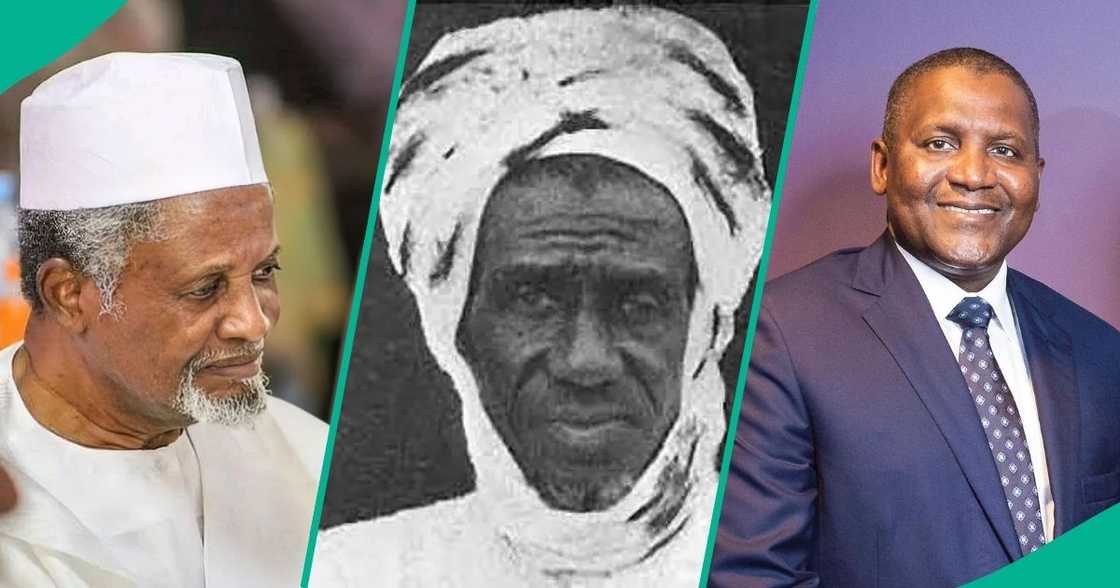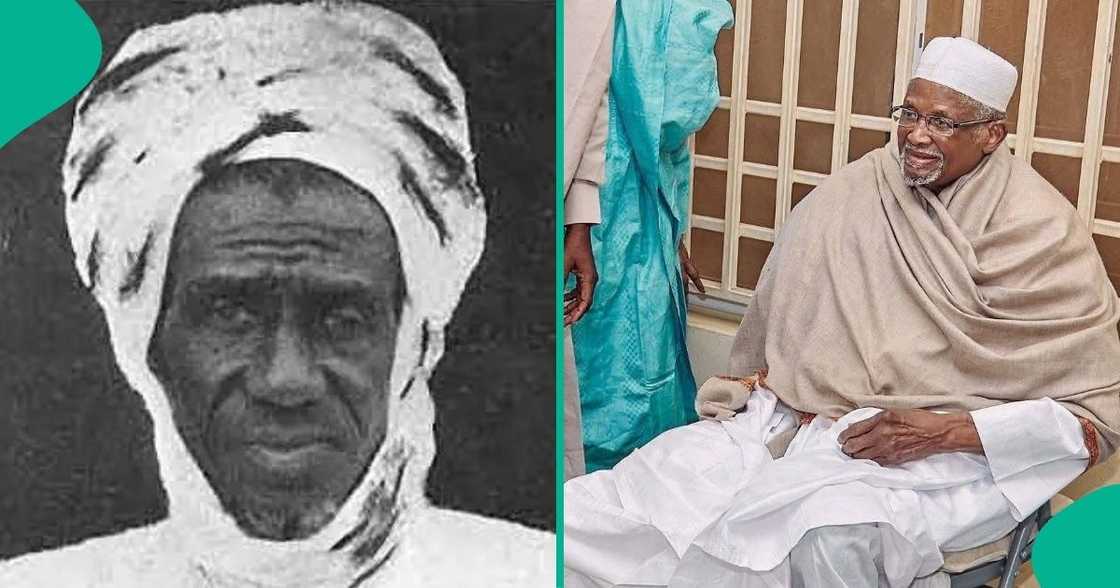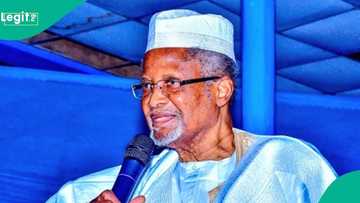10 Things to Know About Alhassan Dantata’s Business Dynasty, List Emerges
- Alhassan Dantata, father of the late Aminu Dantata and great-grandfather of Aliko Dangote, founded one of West Africa’s most enduring business dynasties
- Despite becoming the richest man in Kano in the 1920s, Dantata was known for his modest lifestyle and deep religious devotion
- The dynasty's survival was ensured by Alhassan’s insistence on family unity, innovation in trade, and strategic investments in land
After the death of Aminu Dantata, facts have emerged about the business dynasty of Alhassan Dantata, his father and also the grand-father of Aliko Dangote.
Alhassan Dantata stands as one of West Africa’s most iconic business pioneers, whose legacy shaped not only his family but the entire region’s commercial landscape.

Source: Twitter
Born in 1877 in Bebeji, Kano Emirate, his journey from humble beginnings to becoming the richest man in Kano during the early 20th century is a story of resilience, innovation, and foresight.
As the founder of the Dantata business dynasty, his entrepreneurial spirit laid the foundation for what would become one of Africa’s most influential trading families.
Here are 10 facts about Alhassan Dantata:
1. Founder of the Dantata business dynasty
Alhassan Dantata was the patriarch of a family that would grow to become one of Africa’s most respected and powerful business dynasties.
He established the foundations of a business empire that spans multiple sectors and countries.
His entrepreneurial efforts laid the groundwork for his children and grandchildren, who expanded the family's wealth and influence significantly.
He was also the great-grandfather of Aliko Dangote, Africa’s richest man, linking past and present in a legacy of business excellence. The Dantata family remains a key player in Nigerian commerce, underscoring the lasting impact of Alhassan’s vision and determination.
2. Richest businessman in Kano during the 1920s
In the 1920s, Dantata was recognised as the wealthiest individual in Kano and among the richest men in West Africa.
His prominence was cemented in 1929 when he became the first customer of the Bank of British West Africa’s Kano branch by depositing an astonishing 20 camel-loads of silver coins.
This act not only displayed his vast wealth but also earned him significant respect from colonial authorities, Daily Trust reported.
3. Early trader in kola nuts and groundnuts
Dantata began his trading career focusing on kola nuts and groundnuts, commodities that were highly sought after in West Africa and beyond.
His trade networks stretched from Northern Nigeria deep into the Gold Coast (now Ghana) and even Europe, establishing him as a major player in regional commerce.
His ability to adapt and innovate in his trading methods helped him expand rapidly. By leveraging new transport routes and utilising steamships, he was able to increase the volume and reach of his trade far beyond what was typical for traders of his time.
4. Lived a simple and humble life
As reported by Vanguard, despite amassing great wealth, Dantata was known for his simplicity and humility.
He dressed plainly and lived modestly, preferring to eat simple meals and maintain close ties with his workers and community. This down-to-earth attitude earned him respect and loyalty from those around him.
He often moved among his employees, offering encouragement and assistance when needed. His approachable nature and refusal to adopt an extravagant lifestyle distinguished him from many wealthy contemporaries and made him beloved by many.
5. Overcame adversity during Kano Emirate conflicts
During the political turmoil in Kano between 1893 and 1895, Dantata faced serious challenges.
The Agalawa clan, to which his family belonged, had their properties confiscated after backing the losing faction. He and his brothers were even held for ransom, with threats of slavery hanging over them.
6. Innovator in trade routes and methods

Source: Twitter
Dantata was a pioneer in developing innovative trade methods that expanded his reach.
He was the first to use steamships to transport kola nuts and other goods between key West African cities such as Accra, Kumasi, Sekondi, and Lagos. This modern approach allowed him to outcompete traders relying on traditional caravan routes.
His familiarity with European trading practices and his ability to speak some English gave him a distinct advantage in dealing with colonial merchants and expanding his business network.
These innovations were crucial in establishing his dominance in regional trade.
7. Built wealth through land and diversified interests
Beyond trading, Dantata invested heavily in land, a strategy he urged his family to emulate.
He acquired properties across Nigeria and beyond, including in strategic locations along railway routes and expanding into other sectors such as cattle trading and textiles.
This diversification helped stabilize and grow his wealth over time, allowing the family business to withstand market fluctuations and political changes.
His broad interests laid a robust foundation for the multi-sector conglomerate that the Dantata family business would become.
8. Pioneer in groundnut marketing and export
Dantata was among the first to dominate the groundnut export business in northern Nigeria.
By 1918, he was a key agent for the United Africa Company, purchasing a significant share of groundnuts for export. He secured government licensing in the 1950s to deal directly with the Nigerian Groundnut Marketing Board, increasing his market control.
9. Tradition of philanthropy and religious devotion

Read also
Aminu Dantata: Prominent Nigerian businessman to be buried in Saudi Arabia as details emerge
A devout Muslim, Dantata undertook the Hajj pilgrimage to Makkah by boat in the 1920s and generously financed pilgrimages for others. His commitment to faith and charity was a hallmark of his life and business.
This philanthropic tradition continues in the family, with descendants like Aminu Dantata and Aliko Dangote sponsoring pilgrimages and supporting Islamic institutions. His devotion shaped not only his personal life but also the social responsibilities embraced by the family business.
10. legacy safeguarded through family unity
Before his death in 1955, Dantata called on his children and trusted associates to keep the family business intact and thriving.
He emphasised unity and cooperation, ensuring that Alhassan Dantata & Sons would survive beyond his lifetime.
This foresight helped the business weather challenges and evolve into a thriving dynasty.
Nigerian delegation in Saudi Arabia ahead of Dantata’s interment
Previously, Legit.ng reported that a high-level Nigerian delegation arrived in Madinah, Saudi Arabia, early Monday, June 30, to attend the burial of renowned businessman and elder statesman Aminu Dantata, who passed away in Abu Dhabi on Saturday at the age of 94.
The delegation departed Nigeria late Sunday night, according to a statement issued by Rabiu Ibrahim, Special Assistant to the Minister of Information and National Orientation.
Source: Legit.ng







